江西省初中英语语法复习 动词时态与句型
- 格式:doc
- 大小:42.50 KB
- 文档页数:2
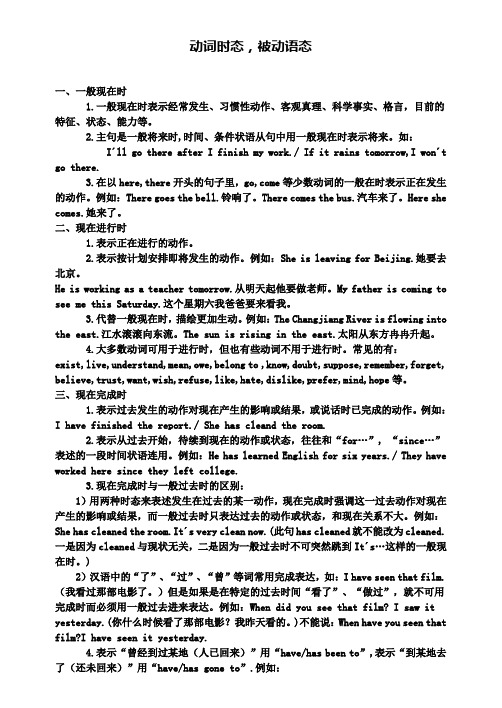
动词时态,被动语态一、一般现在时1.一般现在时表示经常发生、习惯性动作、客观真理、科学事实、格言,目前的特征、状态、能力等。
2.主句是一般将来时,时间、条件状语从句中用一般现在时表示将来。
如:I´ll go there after I finish my work./ If it rains tomorrow,I won´t go there.3.在以here,there开头的句子里,go,come等少数动词的一般在时表示正在发生的动作。
例如:There goes the bell.铃响了。
There comes the bus.汽车来了。
Here she comes.她来了。
二、现在进行时1.表示正在进行的动作。
2.表示按计划安排即将发生的动作。
例如:She is leaving for Beijing.她要去北京。
He is working as a teacher tomorrow.从明天起他要做老师。
My father is coming to see me this Saturday.这个星期六我爸爸要来看我。
3.代替一般现在时,描绘更加生动。
例如:The Changjiang River is flowing into the east.江水滚滚向东流。
The sun is rising in the east.太阳从东方冉冉升起。
4.大多数动词可用于进行时,但也有些动词不用于进行时。
常见的有:exist,live,understand,mean,owe,belong to ,know,doubt,suppose,remember,forget, believe,trust,want,wish,refuse,like,hate,dislike,prefer,mind,hope等。
三、现在完成时1.表示过去发生的动作对现在产生的影响或结果,或说话时已完成的动作。
例如:I have finished the report./ She has cleand the room.2.表示从过去开始,待续到现在的动作或状态,往往和“for…”, “since…”表述的一段时间状语连用。
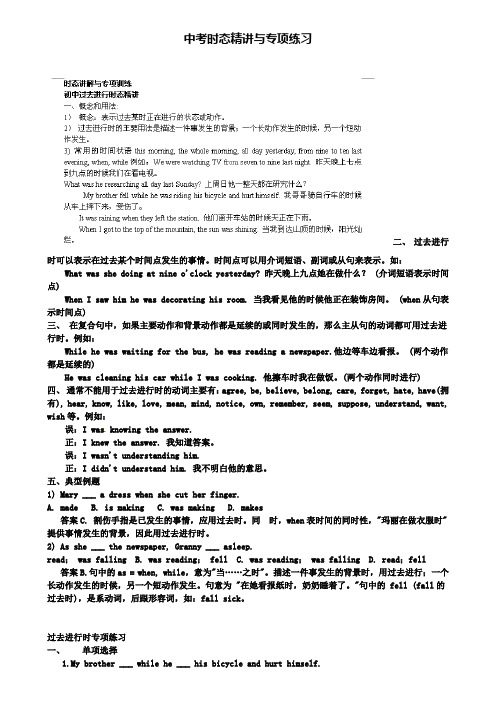
中考时态精讲与专项练习二、过去进行时可以表示在过去某个时间点发生的事情。
时间点可以用介词短语、副词或从句来表示。
如:What was she doing at nine o'clock yesterday? 昨天晚上九点她在做什么? (介词短语表示时间点)When I saw him he was decorating his room. 当我看见他的时候他正在装饰房间。
(when从句表示时间点)三、在复合句中,如果主要动作和背景动作都是延续的或同时发生的,那么主从句的动词都可用过去进行时。
例如:While he was waiting for the bus, he was reading a newspaper.他边等车边看报。
(两个动作都是延续的)He was cleaning his car while I was cooking. 他擦车时我在做饭。
(两个动作同时进行)四、通常不能用于过去进行时的动词主要有:agree, be, believe, belong, care, forget, hate, have(拥有), hear, know, like, love, mean, mind, notice, own, remember, seem, suppose, understand, want, wish等。
例如:误:I was knowing the answer.正:I knew the answer. 我知道答案。
误:I wasn't understanding him.正:I didn't understand him. 我不明白他的意思。
五、典型例题1) Mary ___ a dress when she cut her finger.A. madeB. is makingC. was makingD. makes答案C. 割伤手指是已发生的事情,应用过去时。

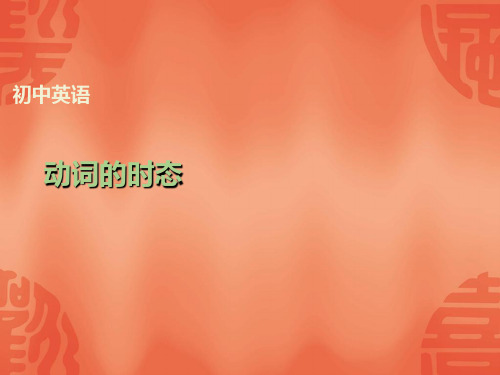
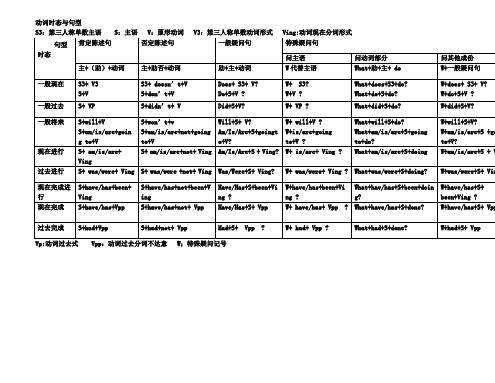
动词时态与句型S3:第三人称单数主语 S:主语 V:原形动词 V3:第三人称单数动词形式 Ving:动词现在分词形式Vp:动词过去式 Vpp:动词过去分词不达意 W;特殊疑问记号中考英语模拟试卷含答案注意事项:1. 答题前,考生先将自己的姓名、准考证号填写清楚,将条形码准确粘贴在考生信息条形码粘贴区。
2.选择题必须使用2B铅笔填涂;非选择题必须使用0.5毫米黑色字迹的签字笔书写,字体工整、笔迹清楚。
3.请按照题号顺序在各题目的答题区域内作答,超出答题区域书写的答案无效;在草稿纸、试题卷上答题无效。
4.保持卡面清洁,不要折叠,不要弄破、弄皱,不准使用涂改液、修正带、刮纸刀。
一、单项选择从下列每题所给的四个选项中, 选择一个最佳答案。
(共15小题;每小题l分,满分15分)1. —These days many people are watching _____ TV series In the Name of People(《人民的名义》). Have you seen it, Mary?—Yes, it’s quite ____excellent play, so I can’t wait to turn on the TV when I get home.A. A; theB. The; anC. A; anD. The; the2. To give a talk, I turned to bookshops and libraries to look for information but found .A. noneB. no oneC. oneD. neither3. It ______ that China ______ its first homemade aircraft carrier (国产航空母舰) in the water in Dalian on April 26, 2017.A. was reported; putB. was reported; was putC. reported; putD. reported; was put4. Tom has already ______ the book for ten days. He must return it _____ the library today.A. read; back toB. bought; toC. borrowed; back toD. kept; to5. ________ of the students’ parents in our class are in their .A. Two-fifths; fortiesB. Two-fifths; fortiethC. Two-fifth; fortiesD. Two-fifth; fortieth6. —Look! Mrs. Smith is standing in front of the teaching building.—It______ her. She has gone to Egypt for her holiday.A. must beB. mustn’t beC. can beD. can’t be7. The man with a black hat was seen _____ the shopping mall just now.A. enterB. enteringC. enteredD. to enter8. —The young man seldom did the housework after he bought the robot, _______?—______ . He could relax and have time for his hobbies.A. did he; YesB. didn’t he; NoC. didn’t he; YesD. did he; No9. I’d like to tell you about the table manners ________ you should know when you visit Korea.A. whichB. whoC. whatD. how10. — When can they finish the project? — ________. Just wait.A. Until next weekB. Not until next WednesdayC. Since several days agoD. For several days11. —Excuse me. Could you please tell me where the nearest post office is? I want to post aletter.—_______ Oh, yes! It’s on the opposite side of the street, behind the Bank of China.A. I don’t know.B. Quite right.C. Mm, let me see.D. Beg your pardon?12. —I think Guilin is a beautiful city.—I agree with you. You can see boats go ______ he river and cars run ______ the city at the same time.A. along; alongB. along; throughC. through; alongD. through; through13.I think this piece of music sounds ______ than the song sung by Jay Chou.A. more excitedB. more excitingC. more excitedlyD. more excitingly14. — we had _______ Disneyland in Shanghai on May Day!A. How fun; visitingB. What fun; visitingC. How fun; to visitD. What fun; to visit15. —Fa ther’s Day is coming. Could you tell me ?—What about a red silk tie? H e’ll like it.A. when I will give my father a surpriseB. what gift I shall give my fatherC. where I will have a big meal with my fatherD. if I will have a party for my father二、完形填空阅读短文, 从每题所给选项中选出可以填入空白处的最佳选项。
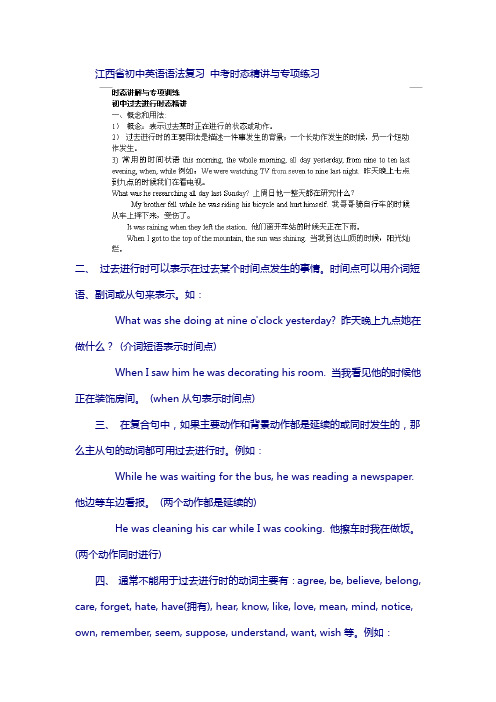
江西省初中英语语法复习中考时态精讲与专项练习二、过去进行时可以表示在过去某个时间点发生的事情。
时间点可以用介词短语、副词或从句来表示。
如:What was she doing at nine o'clock yesterday? 昨天晚上九点她在做什么?(介词短语表示时间点)When I saw him he was decorating his room. 当我看见他的时候他正在装饰房间。
(when从句表示时间点)三、在复合句中,如果主要动作和背景动作都是延续的或同时发生的,那么主从句的动词都可用过去进行时。
例如:While he was waiting for the bus, he was reading a newspaper.他边等车边看报。
(两个动作都是延续的)He was cleaning his car while I was cooking. 他擦车时我在做饭。
(两个动作同时进行)四、通常不能用于过去进行时的动词主要有:agree, be, believe, belong, care, forget, hate, have(拥有), hear, know, like, love, mean, mind, notice, own, remember, seem, suppose, understand, want, wish等。
例如:误:I was knowing the answer.正:I knew the answer. 我知道答案。
误:I wasn't understanding him.正:I didn't understand him. 我不明白他的意思。
五、典型例题1) Mary ___ a dress when she cut her finger.A. madeB. is makingC. was makingD. makes答案C. 割伤手指是已发生的事情,应用过去时。
初中英语语法专项复习:英语各个时态和语态讲解及练习题初中英语有16种时态,但是常用的只有9种:一般现在时、一般过去时、一般将来时、现在进行时、过去进行时、现在完成时、过去完成时、过去将来时、现在完成进行时;下面分别介绍;1、一般现在时的用法1 一般现在时表示经常性、习惯性的动作;表示现在的状态、特征和真理;句中常用always,usually,often,sometimes,seldom,rarely,never,every daymorning,Monday,week,...etc.,every there years,once a weekday,month,...etc.,...等时间状语;例如:a. He goes to school every day.b. He is very happy.earth moves around the sun.2 在时间状语从句和条件状语从句中,用一般现在时表示将来;例如:a. If you come this afternoon, we’ll have a meeting.b. When I graduate, I’ll go to countryside.2.一般过去时的用法1 表示过去某时间发生的事、存在的状态或过反复发生的动作;常和:last weeknight,Monday,month,year,...etc.four years agodays,month,...etc.before1980three,liberation,从句,...etc.the day before yesterday,the day before last,the year before last,just now,a monent ago,yesterday,yesterday morning,this morning,at first,at last,in the end,finally,then,..a. He saw Mr. Wang yesterday.b. He worked in a factory in 1986.2表示过去经常发生的动作, 也可用“used to “ 和“would + 动词原形”; I used to smoke. During the vacation I wouldm in the sea.注:”used to “ 表示过去常发生而现在不再发生的动作或存在的状态;a. I am used to the climate here.b. He is used tomming in winter.3.一般将来时的用法一般将来时表示将来的动作或状态;其表达形式除了“ will 或shall + 动词原形”表示即将发生的或最近打算进行的事;常和:next weekMonday,month,year,...etc.in three daysan hour,...etc.tomorrow,tomorrow morning,the day after tomorrow,the day after next,the year after next,tonight,in 20102016...etc.this evening,this Saturday,after Wednesday,soon,sometime next week,one day in futuer,sooner or later,...1be going to do 结构It is going to rain.We are going to have a meeting today.2 “be about to + 动词原形” 表示即将发生的动作,意为be ready to do sth. 后面一般不跟时间状语; We are about to leave.3 go , come , start, move, leave, arrive ,stay 等可用进行时态表示按计划即将发生的动作;I’m leaving for Beijing.4.现在进行时的用法1 现在进行时表示现在正在进行的动作,由“ be + 现在分词” 构成;常和:now,these daysweeks,months,...etc. this monthweek,...etc.Look,Listen,...另外, “系动词+ 介词或副词” 也表示进行时的意义;What are you doingThe bridge is under construction.2 表示感觉、愿望和状态的某些动词如have, be , here, se, like 等一般不用进行;5.过去进行时的用法1 过去进行时过去某一时刻、某一阶段正进行的动作,由“ was were + 现在分词”构成;常和:this time yesterday,this time last Friday,in those days,at nine last night,from one to three yesterday afternoon,...In 1980 he was studying in a university.He was reading a novel when I came in.6.现在完成时的用法现在完成时由“have/has + 过去分词.其使用有两种情况:1 现在完成时所表示的动作在说话之前已完成,但对现在有影响;句中没有具体时间状语;常和:just,alreadly,yet,never,ever,now,before,this week,today,these days,once,twice,three times,...He has gone to Fuzhou.He has been to Fuzhou.2 现在完成时所表示的动作开始于过去,持续到现在,也许还会持续下去常用for 和since表示一段时间的状语或since then1949,last Monday,two o'clock,从句...,etc.,ever since then,for three daysa long time,two hours,...etc.so far , now, today, this wek month, year 等表示包括现在内的状语;He has studied English for 5 years.He has studied English since 1985.Now I have finished the work..注意:表示短暂时间动作的词如come, go , die, marry, buy 等的完成时不能与for, since 等表示一般时间的词连用;正确:I have bought the book already.错误:I have bought the book for two years.改:I have had the bookl for two years.7.过去完成时的用法1 过去完成时由“had + 过去分词”构成;过去完成时的动作表示过去某一时刻或某一时刻或某一动作之前完成的动作或状态;句中常用by then1977,yesterday,eight last night,the time we got there,...etc.by the end of last termweek,year,month,...etc..by, before, until, when 等词引导的时间状语;By the end of last year we had built five new houses.I had learnt 5000 words before I entered the university.2过去完成时的动词还可表示过去某一时刻之前发生的动作或状态持续到过去某个时间或持续下去;Before he slept, he had worked for 12 hours.8.过去将来时的用法过去将来时表示从过去的某个时间看来将要发生的动作或存在的状态;过去将来时由“should 或would + 动词原形” 构成;第一人称用should, 其他人称用would. ;常和:They were sure that they would succeed.二动词语态1.当句子的主语是动作的执行者时, 谓语的形式叫主动语态;句子的主语是动作承受者时,谓语的形式叫被动作语态;被动语态由助动词be + 过去分词构成,时态通过be 表现出来;1 一般现在时:You are required to do this.2 一般过去时:The story was told by her.3 一般将来时:The problem will be discussed tomorrow.4 现在进行时:The road is being widened.5 过去进行时:The new tool was being made.6 现在完成时:The novel has been read.7 过去完成时:He said that the work had been finished.8 过去将来时:He said that the trees would be planted soon.2. 一些特殊的被动结构1 带情态动词的被动结构:The problem must be solved soon.2 带不定式的被动结构:The room is going to be painted.The homework needs to be done with care.3 短语动词的被动:a.不及物动词+介词:若这类短语动词是及物性的,则可用于被动语态中,如:laugh at, look after, talk about, think of 等;若这类短语动词是不及物性的则不可用于被动语态中,如:book up, look down. 等b.及物动词+副词:bring about, carry out, find out, make out, put away, put off, take up, turn down, turn out, wipe out 等c. 动词+副词+介词:do away with, face up to, give into ,look down upon, make up with等d. 动词+名词+介词:catch sight of, keep on eye on, make a fool of , pay attention to , put an end to , set fire/light to , take notice of 等4 带复合宾语的动词在改为被动语态时,一般把主动结构中的宾语改为主语,宾语补足语保留在谓语后面;We always keep the classroom clean.比较:The classroom is always kept clean.5主动形式表示被动意义的词;常见的有:a.主动形式,这时动名词同句中的主语有动宾关系;The children need looking after.The windows wants /requires repairing.This point deserves mentioning.练习题1. It is a fine day. The sun __________shine brightly.2. They ___________visit the Science Museum next Sunday.3. Mr Brown________live in Beijing since he came to China.4. Mr Wang ________teach us English two years ago.5. The Smiths _______________ watch TV at this time last night.6. We __________learn about ten English songs by the end of last term.7. Father said that he ____________buy a new bike for me the next Friday.8. Bill isn¡¯t here. He ___________chat with his friends in the classroom.9. The teacher said that the moon __________go round the earth.10. The Young Pioneers will go to the zoo if it ____________not rain this Sunday.11. Listen They __________talk about the new film.12. Jim asked us what ___________happen in China in 1976.13. My mobile phone ___________steal on a bus last week.14. The host ____________interview the little boy just now.15. The Greens __________watch TV now.16. He said that he _____________ring me up when he got there.17. We ____________learn English for about three years.18. My brother_____________join the League in 1997.19. The farmers __________pick apples when I saw them.20. The red skirt __________cost the girl forty yuan.21. The film ____________begin when I got to the cinema.22. The girl told me that she wanted to be an English teacher when she _____grow up.23. My sister is a student and she _____________study at a middle school nearby.24. Mr Green __________travel to several places in South China since he came here.25. You _________catch the early bus if you get up early.26. _______you been________wear glasses all the time27. I’ll go home as soon as I _______finish my homework.29. Most science books are ______write in English.30. I ____________stay there for two months last year.31. Tell Lily to call me as soon as she _______.A. will arriveB. gets thereC. has goneD. reach here32. ----Hi, Kate. You look tired. What’s the matter ----I ______ well last night.A. didn’t sleepB. don’t sleepC. haven’t sleptD. won’t sleep33. ----Excuse me, look at the sign over there, please. Could you stop smoking----Sorry, I ____ that.A. didn’t seeB. don’t seeC. won’t seeD. can’t see34. ----Well, I found this. I think it must be yours. ----My watch Thank you. Where _____itA. do you findB. had you foundC. were you findingD. did you find35. ----Don you know when Dr White ____ for dinner this evening----No, but I think he ____ when he is free.A. will come; comesB. will come; will comeC. comes; comesD. comes; will come36. Look at those black clouds. It _____ rain. Let’s hurry. A. maybe B. would C. has D. is going to37. ----Jimmy is leaving for a holiday. ----Really Where ____ he ____A. has; goneB. will; goC. did; goD. does; go38. ----Shall we go shopping now ---Sorry, I can't. I ____ my shirts.A. washB. washesC. washedD. am washing39. ----I called you yesterday evening, but there was no answer.----Oh, I am sorry. I ___ dinner at my friend's home.A. haveB. hadC. was havingD. have had40. The Oriental Pearl TV Tower ____ thousands of visitors since 1995.A. attractedB. attractsC. has attractedD. will attract46. ----Why didn't you go to the cinema yesterday -----Because I ____ the film before.A. had seenB. have seenC. have watchedD. has watched47. I don't think John saw me. He ____ a book at that moment.A. just readB. has just readC. was just readingD. had just read48. Mr Smith ____ a book about China last year but I don't know whether he has finished it.A. has writtenB. wroteC. had writtenD. was writing49. Mr White ____ the newspaper while his daughter ____TV.A. has read; was watchingB. was reading; watchedC. was reading; was watchingD. reading; watched50. ---- I ____ you at the meeting. Why ----I was ill. A. saw B. have seen C. not see D. didn't see51. The 29th Olympic Games ____ in Beijing in 2008. A. hold B. will hold C. will be held D. held52. Hurry up The play ____ for ten minutes. A. has been on B. has begun C. had begun D. began53. ----May I speak to Mr Smith ----Sorry, he ____ Australia. But he ____ in two days.A. has been to; will come backB. has gone to; will be backC. has been in; would come backD. is leaving for; doesn't come back54. I can't go to the theater tonight because I ____ my ticket.A. have lostB. had lostC. will loseD. was losing55. ----What a nice bike How long ____ you ____ it ----Just two weeks.A. have; boughtB. did; buyC. have; hadD. are; having56. ----I'm sorry to have kept you waiting. ----Oh, not at all. I ____ here only for a few minutes.A. have comeB. had beenC. wasD. have been57. ----____ my dictionary anywhere ---- Yes. I saw it on your desk a moment ago.A. Did you seeB. If you seeC. Had you seenD. Would you see58. We were all surprised when he mad it clear that he ____ office soon.A. leavesB. would leaveC. will leaveD. had left答案:I. 1. shines/ is shining 2. are going to/ will visit 3. has lived 4. taught5. were watching6. had learned7. would buy8. is chatting9. goes 10.doesn't rain 11. are talking 12. happened 13. was stolen 14. interviewed15. are watching16. would ring 17. have learned 18. joined 19. were picking 20. cost21. had begun 22. grew 23. studies 24. has traveled 25. will catch26. Have; wearing 27. finish 28. haven't heard 29. written 30. stayedII. 31--35 BAADB 36--40 DBDCC 41--45 ACBAC 46--50 ACDCD51--55 CABAC 56--60 DABDA 61--65 BDBAB 66-70 BDABC 71--75 BCADD。
动词时态、语态I.根据句意,用所给动词的适当形式填空。
1. It is a fine day. The sun __________(shine) brightly.2. They ___________(visit) the Science Museum next Sunday.3. Mr Brown __________(live) in Beijing since he came to China.4. Mr Wang ___________(teach) us English two years ago.5. The Smiths _______________( watch) TV at this time last night.6. We __________(learn) about ten English songs by the end of last term.7. Father said that he ____________(buy) a new bike for me the next Friday.8. Bill isn’t here. He ___________(chat) with his friends in the classroom.9. The teacher said that the moon __________(go) round the earth.10. The Young Pioneers will go to the zoo if it ____________(not rain) this Sunday.11. Listen! They ____________(talk) about the new film.12. Jim asked us what ___________(happen) in China in 1976.13. My mobile phone ___________(steal) on a bus last week.14. The host ____________(interview) the little boy just now.15. The Greens __________(watch) TV now.16. He said that he _____________(ring) me up when he got there.17. We ____________(learn) English for about three years.18. My brother_____________(join) the League in 1997.19. The farmers __________(pick) apples when I saw them.20. The red skirt __________(cost) the girl forty yuan.21. The film ____________(begin) when I got to the cinema.22. The girl told me that she wanted to be an English teacher when she _____(grow) up.23. My sister is a student and she _____________(study) at a middle school nearby.24. Mr Green __________(travel) to several places in South China since he came here.25. You _________(catch) the early bus if you get up early.26. _______you been________(wear) glasses all the time?27. I’ll go home as soon as I ___________(finish) my homework.29. Most science books are _______________(write) in English.30. I ____________(stay) there for two months last year.II.根据句意,选择填空。
江西省初中英语语法复习动词时态,被动语态一、一般现在时1.一般现在时表示经常发生、习惯性动作、客观真理、科学事实、格言,目前的特征、状态、能力等。
2.主句是一般将来时,时间、条件状语从句中用一般现在时表示将来。
如:I´ll go there after I finish my work./ If it rains tomorrow,I won´t go there.3.在以here,there开头的句子里,go,come等少数动词的一般在时表示正在发生的动作。
例如:There goes the bell.铃响了。
There comes the bus.汽车来了。
Here she comes.她来了。
二、现在进行时1.表示正在进行的动作。
2.表示按计划安排即将发生的动作。
例如:She is leaving for Beijing.她要去北京。
He is working as a teacher tomorrow.从明天起他要做老师。
My father is coming to see me this Saturday.这个星期六我爸爸要来看我。
3.代替一般现在时,描绘更加生动。
例如:The Changjiang River is flowing into the east.江水滚滚向东流。
The sun is rising in the east.太阳从东方冉冉升起。
4.大多数动词可用于进行时,但也有些动词不用于进行时。
常见的有:exist,live,understand,mean,owe,belongto ,know,doubt,suppose,remember,forget,believe,trust,want,wish,refuse,like,hate,dislike,prefer,mind,hope等。
三、现在完成时1.表示过去发生的动作对现在产生的影响或结果,或说话时已完成的动作。
动词时态语法复习讲义一般现在时一、动词的第三人称词尾变化:当主语是第三人称单数时,谓语动词需加-s或-es:规则动词原形第三人称单数形式一般在词尾加-s,(清辅音后读∕s∕,在浊辅音后读∕z∕;在t后读∕ts∕,在d后读∕dz∕。
) playleaveswimplaysleavesswims以字母s,x,ch,sh,o结尾的词加-es,读∕iz∕,如果动词原形词尾已有e,则只加-s。
passfixteachwishdopassesfixesteacheswishesdoes以辅音字母加y结尾的词,先变y为i, 再加-es,读∕z∕。
studycarryflystudiescarriesflies注意:动词have的第三人称单数是has.写出下列动词的单数第三人称形式。
1. cook _______2.watch________3.build_________4.have________5.wash________6. enjoy ______7. go _________8 receive ______9 cry______10. close ________11. drive _______12. choose ______13. play ________14. reach ________二. 一般现在时的用法1)表示经常的或习惯性的动作,常与表示频度的副词连用。
常用的频度副词有: always、often、 usually、seldom、never。
频度副词在句中通常放在行为动词之前,系动词、助动词之后。
例如: He often goes swimming in summer.他夏天经常游泳。
I usually leave home for school at 7 every morning. 每天早上我七点离开家。
2)表示现在的状态。
例如:My father is at work.He is very busy. 我父亲在工作,他很忙。